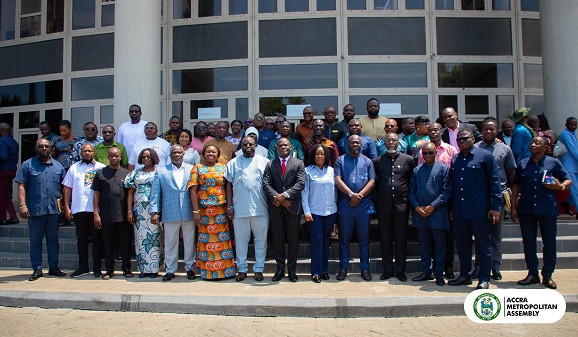Ahmed Ibrahim, the Minister of Local Government, Chieftaincy and Religious Affairs (MLGCRA), has said the re-introduction of the National Sanitation Day (NSD) is a renewed social contract between government and citizens, anchored on accountability, enforcement, and sustainability.
He said Ghana, like many rapidly urbanising countries, continued to face major challenges in sanitation and waste management, from indiscriminate dumping of refuse to choked drains contributing to perennial flooding, and to the unsightly heaps of waste in the markets.
The Minister was speaking at a press conference to share important information on the NSD, and to give clear directives to all Metropolitan, Municipal and District Chief Executives (MMDCEs), prior to the official launch by President John Dramani Mahama in Accra.
The official launch of the NSD is slated for Saturday, September 6, 2025, at the Institute of Local Government Studies, Madina, Accra.
The NSD is a flagship initiative of the Government under the “Clean Up Ghana Agenda.”
Mr. Ibrahim said the NSD which was first launched in 2014, demonstrated that when citizens, assemblies, traditional leaders, and civil society come together, the communities could be made cleaner and healthier.
He said the NSD was relaunched to restore discipline and pride in public spaces because a clean environment is a necessity for public health and national dignity.
The Minister said it was also to empower and mobilise local government structures, and foster citizen participation and accountability.
“With sanitation now fully integrated as a Key Performance Indicator (KPI) for MMDCEs, Assemblies must take ownership and leadership in ensuring sustainable cleanliness,” he stressed.
The Minister, in exercising the supervisory authority of the Ministry, directed all MMDCEs to clear all public spaces, ceremonial streets, and visible nuisances within their jurisdiction by 8:00 a.m. every day, beginning tomorrow, September 4, 2025.
He said this directive should be sustained in all Assemblies, and that the first six months would serve as a performance benchmark during which Assemblies were required to progressively shorten the timeframe for removal of the nuisances stated.
Mr. Ibrahim said Assemblies must prioritise the desilting of drains, the removal of waste heaps, and the regular cleansing of ceremonial routes, markets, lorry stations, schools, and public spaces.
“Assemblies must also mobilise and deploy their environmental health officers, waste management officers, private waste service providers, community volunteers and the citizens to sustain the compliance of this directive,” he added.
The Minister said lack of funds had often been cited as an excuse for non-performance especially in the sanitation space, for which reason 80 per cent of the District Assemblies Common Fund had been released to the Assemblies, with part of it to be used for this exercise.
Mr. Ibrahim said the Ministry was introducing additional accountability measures including a dedicated sanitation hotline which would be established, enabling citizens to report public cleansing nuisances directly to the Ministry.
He said reports would be catalogued, verified, and followed up with the relevant assemblies for immediate action.
He said the Ministry would maintain a central dashboard to track reports, responses, and performance of assemblies, to ensure real-time supervision and national oversight.
Mr. Ibrahim appealed to media houses in Ghana to support the districts in their areas of operation to educate the citizens, as improved sanitation, all over the world was built on the attitude of the people.
He urged the Members of Parliament to use their influence to mobilise their communities, monitor performance in their constituencies, and hold their assemblies accountable.
GNA





